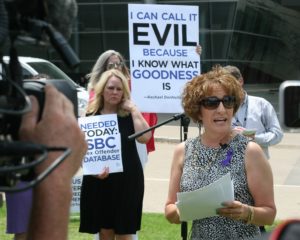Leading up to a review of how his own denomination mishandles abuse allegations, Southern Baptist Convention President J.D. Greear expressed grief over a grand jury report finding evidence of widespread sexual abuse by Catholic priests in Pennsylvania.

J.D. Greear
“I also recognize that this is not an isolated problem,” Greear, pastor of The Summit Church in Raleigh-Durham, North Carolina, said in comments to Baptist Press. “We must ask ourselves what bold steps need to be taken in eradicating this horrific sin from within our community.”
Greear announced in July plans to form a Sexual Abuse Prevention Study Group, in conjunction with the SBC Ethics and Religious Liberty Commission, composed of Southern Baptist leaders and outside experts to advise him on “issues related to sexual abuse, sexual assault, domestic violence and related subjects.”
Attention to #MeToo and #ChurchToo movements took center stage at this year’s SBC annual meeting in Dallas, convened on the heels of the firing of a seminary president for allegedly failing to report rape incidents to police.
A convention resolution apologized for past failures to protect abuse victims in evangelical churches and ministries, “including such failures within our own denomination.”
With traditions of local-church autonomy and voluntary cooperation, Southern Baptists are organized much differently than the Roman Catholic hierarchy, but experts say there are common themes in the way the two traditions react to potential scandal.
The Pennsylvania grand jury found that despite “idiosyncrasies” in each diocese they examined, “the pattern was pretty much the same” in accusations detailed in the nearly 900-page report.
“The main thing was not to help children, but to avoid ‘scandal,’” the grand jury said. “That is not our word, but theirs; it appears over and over again in the documents we recovered.”
The strategies were so common, the grand jury found, that the FBI was able to compile what amounts to “a playbook for concealing the truth.”
“First, make sure to use euphemisms rather than real words to describe the sexual assaults in diocese documents,” the grand jury said. “Never say ‘rape’; say ‘inappropriate contact’ or boundary issues.’

Survivor advocates gathered at this summer’s SBC annual meeting to demand changes in the way the nation’s second-largest faith group handles allegations of physical and sexual abuse. (Photo by Bob Allen)
“Second, don’t conduct genuine investigations with properly trained personnel. Instead, assign fellow clergy members to ask inadequate questions and then make credibility determinations about the colleagues with whom they live and work.
“Third, for an appearance of integrity, send priests for ‘evaluation’ at church-run psychiatric treatment centers. Allow these experts to ‘diagnose’ whether the priest was a pedophile, based largely on the priest’s ‘self -reports,’ and regardless of whether the priest had actually engaged in sexual contact with a child.
“Fourth, when a priest does have to be removed, don’t say why. Tell his parishioners that he is on ‘’sick leave,’ or suffering from ‘nervous exhaustion.’ Or say nothing at all.
“Fifth, even if a priest is raping children, keep providing him housing and living expenses, although he may be using these resources to facilitate more sexual assaults.
“Sixth, if a predator’s conduct becomes known to the community, don’t remove him from the priesthood to ensure that no more children will be victimized. Instead, transfer him to a new location where no one will know he is a child abuser.
“Finally and above all, don’t tell the police. Child sexual abuse, even short of actual penetration, is and has for all relevant times been a crime. But don’t treat it that way; handle it like a personnel matter, ‘in house.’”
The grand jury recommended legislation to eliminate the criminal statute of limitations for sexually abusing children, make it easier for child sex-abuse victims to file lawsuits, clarify penalties for continuing failure to report child abuse and prohibit “non-disclosure” agreements that hinder criminal investigations.
The grand jurors said, however, they want more than just criminal and civil penalties for clergy abuse.
“We want it not to happen at all,” they said in the report. “We think it’s reasonable to expect one of the world’s great religions, dedicated to the spiritual well-being of over a billion people, to find ways to organize itself so that the shepherds stop preying upon the flock.”
“If it does nothing else, this report removes any remaining doubt that the failure to prevent abuse was a systemic failure, an institutional failure,” the jurors said. “There are things that the government can do to help. But we hope there will also be self-reflection within the church, and a deep commitment to creating a safer environment for its children.”
In addition to Greear’s presidential group study, the SBC International Mission Board has promised outside investigations into how it handles abuse allegations among more than 3,500 Southern Baptist missionaries deployed around the world.
Greear said over the last several weeks he has heard from “many” advocates, survivors, counselors, denominational leaders and legal experts and looks forward “to unveiling new steps that we as Southern Baptists can take together.”
Previous stories:
Advocates seek transparent probe into alleged abuse failures by SBC
Abuse arrest turns #MeToo spotlight on SBC International Mission Board
18 years after child porn conviction, Baptist pastor accused of trying to entice a minor
Church camp rape lawsuit ends in settlement
Advocates seek transparent probe into alleged abuse failures by SBC
Related commentary:
Our ‘sin of the bystander’ enables sexual abuse. We must change
